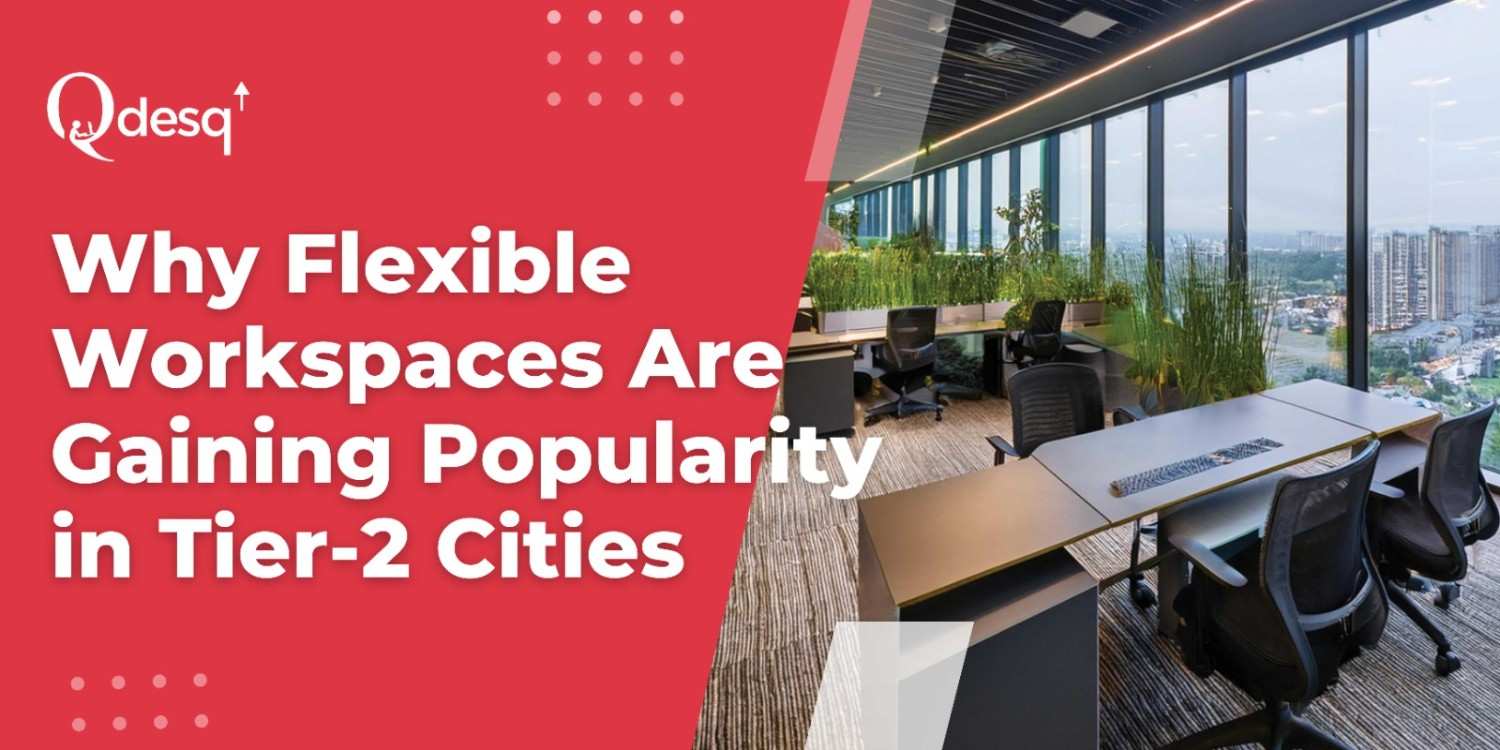The way we work is undergoing a paradigm shift, and it’s not just happening in big metros. Tier-2 cities in India—once considered secondary markets—are now at the forefront of this change, embracing flexible workspaces as a cornerstone of their growing economic activity. From coworking spaces in Chandigarh to shared offices in Vizag, smaller cities are becoming powerhouses of innovation and entrepreneurship.
This isn’t just a trend; it’s a testament to how India’s work culture is evolving, and tier-2 cities are driving this transformation. Let’s dive deep into why flexible workspaces are booming in these emerging hubs and how they’re shaping the future of work.
The Rise of Tier-2 Cities | Why the Shift?
The spotlight has shifted from India’s tier-1 cities like Delhi, Mumbai, and Bengaluru to tier-2 cities like Lucknow, Jaipur, and Indore. Why
Affordability
Tier-2 cities offer lower operational costs—office rents, utilities, and employee wages are significantly lower than in metros. This is a golden opportunity for startups and SMEs to scale without financial strain.
Improved Infrastructure
Government initiatives like Smart Cities Mission and Make in India have transformed smaller cities into modern, business-ready hubs. Improved internet connectivity and transportation have played a pivotal role.
Talent Migration
A growing trend of reverse migration has seen professionals returning to their hometowns in tier-2 cities for better work-life balance. This has created a ready pool of skilled talent.
Entrepreneurial Ecosystem
Cities like Jaipur and Kochi are seeing a rise in tech startups, creative agencies, and freelancers. Coworking spaces cater to this new wave of entrepreneurs by offering affordable, plug-and-play office solutions.
Why Flexible Workspaces Are Thriving in Tier-2 Cities
Flexible workspaces are more than just an economic choice; they transform how businesses operate. Here’s why they’re making such an impact in tier-2 cities:
Cost-Efficient and Scalable Solutions
For a startup in Bhopal or a freelancer in Kolkata, renting a traditional office can be prohibitively expensive. Flexible workspaces provide a fully serviced office with everything included—high-speed internet, meeting rooms, and even coffee—at a fraction of the cost. These spaces also offer scalability, allowing businesses to expand without committing to long-term leases.
Access to Prime Locations
Coworking providers in tier-2 cities strategically position their spaces in central business districts, giving companies access to prestigious addresses without the hefty price tag. A coworking space in Chandigarh or a shared office in Coimbatore can instantly elevate a brand’s credibility.
Professional Environment Without Isolation
Remote work has its perks, but it can also be isolating. Flexible workspaces offer a professional setup where individuals can network, collaborate, and find a sense of community. This is particularly impactful for freelancers and small teams.
Vibrant Networking Opportunities
Coworking spaces thrive on collaboration. Whether it’s a tech entrepreneur in Kochi or a creative agency in Lucknow, the opportunity to connect with like-minded professionals often leads to partnerships, new clients, or even mentors.
Boosting Employee Productivity
Flexible workspaces are designed to inspire productivity. Ergonomic furniture, breakout areas, natural lighting, and amenities like fitness zones and cafeterias help professionals stay energized and focused.
Spotlight on Top Tier-2 Coworking Hubs
Jaipur
Known as the Pink City, Jaipur is witnessing a startup boom. The best coworking spaces in Jaipur blend modern aesthetics with local cultural touches, attracting creative professionals and tech startups alike.
Kochi
As one of India’s fastest-growing IT hubs, coworking in Kochi caters to remote teams, freelancers, and enterprises. Many spaces here offer waterfront views and advanced tech infrastructure.
Chandigarh
Planned and progressive coworking spaces in Chandigarh are ideal for IT professionals, consultants, and startups. These spaces offer proximity to major corporate offices and government institutions.
Lucknow
The City of Nawabs is also becoming the city of business opportunities. Coworking spaces in Lucknow empower startups and SMEs to thrive in a professional yet flexible environment.
Indore
Indore has emerged as a fintech and e-commerce hotspot. Coworking spaces here are designed for startups and small businesses, offering 24/7 access and premium amenities.
The Emotional Side of Flexible Workspaces
Beyond practicality, flexible workspaces resonate on an emotional level. For many professionals, these spaces represent a bridge between the comfort of home and the structure of a traditional office. They foster a sense of belonging, combat isolation, and provide personal and professional growth opportunities.
Future Trends | Where Flexible Workspaces in Tier-2 Cities Are Headed
1. Tech-Enhanced Workspaces
Expect more coworking spaces to adopt technologies like AI for resource management and IoT for smart meeting rooms.
2. Sustainability Focus
Eco-friendly designs, solar-powered infrastructure, and waste-reduction practices will become standard.
3. Expansion to Tier-3 Cities
Providers are already eyeing smaller towns, making premium office spaces accessible to a wider audience.
4. Industry-Specific Spaces
Tailored coworking hubs for industries like design, IT, or fintech will grow, offering specialised amenities for specific business needs.
Closing Thoughts
The popularity of flexible workspaces in tier-2 cities is not just a shift—it’s a revolution. Coworking spaces in Tier 2 cities are levelling the playing field, giving businesses in smaller cities access to world-class infrastructure and fostering a culture of collaboration and innovation. Coworking spaces are more than just an office for startups, SMEs, and freelancers—they’re a gateway to growth and success.











